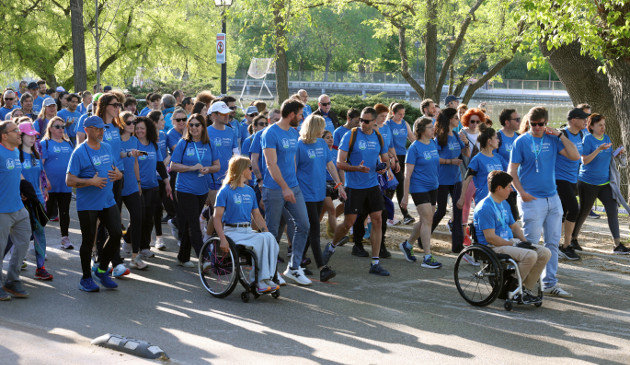
By Dr Julie Smith
Clinical psychologist, best-selling author and social influencer
Wellbeing at work is important, so you need to be able to spot the tell-tale signs of burnout before it becomes a problem for you or your team. Dr Julie Smith talks to Bupa leaders to find out how they're helping employees avoid becoming overwhelmed.
Burnout can affect anyone – from the most senior managers right down to students before they even start work – but it's interesting that the term was coined by American psychologist Herbert Freudenberger to describe a pattern he saw in ‘helping’ professions such as healthcare.
What is burnout?
I would describe burnout as a state of physical and emotional exhaustion brought about by extended periods of high-level stress. In my professional experience, it can have catastrophic effects on mental and physical health if left unchecked. I like to think of it like driving on the motorway in second gear – you will be aware that something is awry and if you don’t do anything about it, things can go seriously wrong.
In the workplace, burnout rates rose rapidly during the Covid-19 pandemic, according to the McKinsey Health Institute. As a result, its report estimates that “nine in ten organisations around the world offer some form of wellness programme.” Bupa is no exception and we share some examples below.
If you feel emotionally drained and exhausted, as though you have no resources left, you may be at risk of burnout. There are a range of physical symptoms including sleep difficulties and changes in mood, including agitation, irritability and anxiety.
How can I spot signs of burnout in my team?
If you notice people on your team presenting with the symptoms above, they may be beginning to burn out. But perhaps a better way to look at the risk in your team is to look at the underlying causes. This is an area where managers can deliver structures and programmes that help teams feel supported and valued – and avoid burnout.
Generally, the causes for burnout can be grouped into five areas. These are the key questions you should ask yourself to stop your team heading towards them:
- Does your team have the resources they need to meet the demands it is faced with?
- Are they appropriately rewarded or recognised financially or socially?
- Do they have sufficient community or social support and positive human interaction?
- Could there be a perceived lack of fairness in terms of resources, reward or community?
- Are they being asked to do things that contradict their personal values?
What are Bupa teams doing to prevent burnout?
I spoke to some Bupa team leaders to find out the things they are doing to head off burnout in their teams. Cheryl Richards, a Sales Team Manager for Bupa UK, has a weekly two-hour drop-in chat session to keep an open line of communication for team members to voice how they feel.
“Because they feel able to reach out instead of getting worried or stressed, it creates trust,” she says. “And the result is they feel supported. It also helps to restore connections when people are working remotely, especially if one or more of their colleagues are also on the call”.
Chanel Nesci, psychologist and General Manager of Wellbeing and Safety for Bupa in Australia, believes in leading by example. “As a leader I demonstrate the importance of prioritising my wellbeing over work by, for instance, putting my family first – making sure I'm at special school events wherever possible”.
Setting an example to avoid burnout
“As a wellbeing team, we know how to look after ourselves,” adds Chanel. “It becomes challenging when we feel like there's too much to do and we don't put ourselves first. If we can't effectively demonstrate self-care, how can we expect other teams to?
“I know that what I actively show is important to me will also become important to my team and their teams – this knock-on impact is immeasurable and I take my responsibility for setting the right tone really seriously”.
For Debbie Leonard, a Dental Care Practice Manager for Bupa UK, psychological safety is “paramount to dealing with team burnout and the overall health of your team”.
She says, “When your colleagues feel their concerns will be heard without repercussions, they will be more open and communicative about their experiences. You also need to be open minded and empathetic when colleagues or teams are discussing something distressing or difficult for them to talk about.
“By adopting this approach we’ve seen changes including flexible working adjustments and a team who are open, happy and engaged”.
Why rewards matter in avoiding burnout
Debbie is also keen to offer rewards to her team. “We normally think of rewards as an incentive to perform, but if all your perks are performance-based you can actually set people on a path to burnout”, she says.
“Some rewards should exist simply because people matter. Whether it's a gift card, extra break time, picking up a colleague's work at the end of a shift so they can leave early or amazing snacks in the break room, letting a person know they have value goes a seriously long way. I routinely give rewards as a way to boost team morale and engagement. It creates an exciting and celebratory atmosphere in the team”.
Cheryl also believes in encouraging teams to take a break, go for lunch or simply get away from their screens for a bit. “They can go for a walk, sit in the garden or call a friend or colleague to catch up. We send reminders to look out for signs of burnout and take action to fend it off”, she explains.
Bupa's wellbeing-supportive tools
Bupa offers its employees a whole range of benefits to ensure they can access medical cover, regardless of their level of seniority in the company, or the area of the business they work in.
There are also many more regular events and services on offer to employees as Chanel explains: “My team carve out time to participate in wellbeing related activities at Bupa, such as skin and health checks and wellbeing workshops and events. Being able to participate in these events breaks up the workday, enables professional and personal development, as well as networking and connection opportunities”.
We also have access to an internal wellbeing programme called Personal Energy delivered by health and wellbeing specialists, which educates participants on wellbeing foundations, and supports ways to integrate practical skills within their work and personal lives and relationships. This programme has been used to strengthen connections and relationships within teams, has developed more positive working practices, and has increased the overall understanding and focus on the wellbeing of our leaders.
Understanding stress, lifestyle and the path to burnout
Stress is normal and healthy – we need it in our lives. But our threat system is built to be used over short periods separated by rest and replenishment. It doesn’t match up to today's ‘hustle culture’. Working yourself to the bone knowing you have a holiday booked months ahead could lead to an unmanageable build-up of stress. Your brain and body will benefit much more from the chance to replenish a little every day.
When we reach burnout we often have a well-established but unsustainable lifestyle. That's because we have certain demands or expectations we are striving to live up to. Most people know that more rest, sleep, exercise and social connection will help. But letting go of our own unrealistic expectations is the key to making meaningful changes. Don't underestimate this: re-evaluating your lifestyle is not an easy task.
The Mayo Clinic offers a range of ideas aimed at staving off burnout, many mirrored in this article. But it gives two pieces of advice that make for a good starting point: “try to take action” and “keep an open mind as you consider the options”.
Of course, preventing burnout is much more complex and nuanced than finding one thing that will fix everything, but I would say the first place to start is to get the amount of sleep your body truly needs. Once you start to do this everything else becomes easier and you can start to think more clearly and make careful, informed decisions.
Being able to recognise the signs, symptoms and underlying causes of burnout is crucial to spotting when others – perhaps in your teams – may be struggling with the balance in their lives. Armed with the advice in this article, I hope you can implement structures and programmes that can help them to realign, restore, recover and become happy and productive team members.
More about Dr Julie

Dr Julie is a clinical psychologist, best-selling author and social sensation. After running her own private practice for almost a decade, Dr Julie began sharing her digestible, informative videos on TikTok in 2019. Her often-viral videos cover a variety of mental health topics from anxiety and depression to confidence. Dr Julie has now amassed an audience of over six million and is the go-to online resource for mental health tips and tricks. Her debut book, Why Has Nobody Told Me This Before? was the bestselling non-fiction book of 2022. Dr Julie features regularly on This Morning and BBC Radio 1 Life Hacks.



